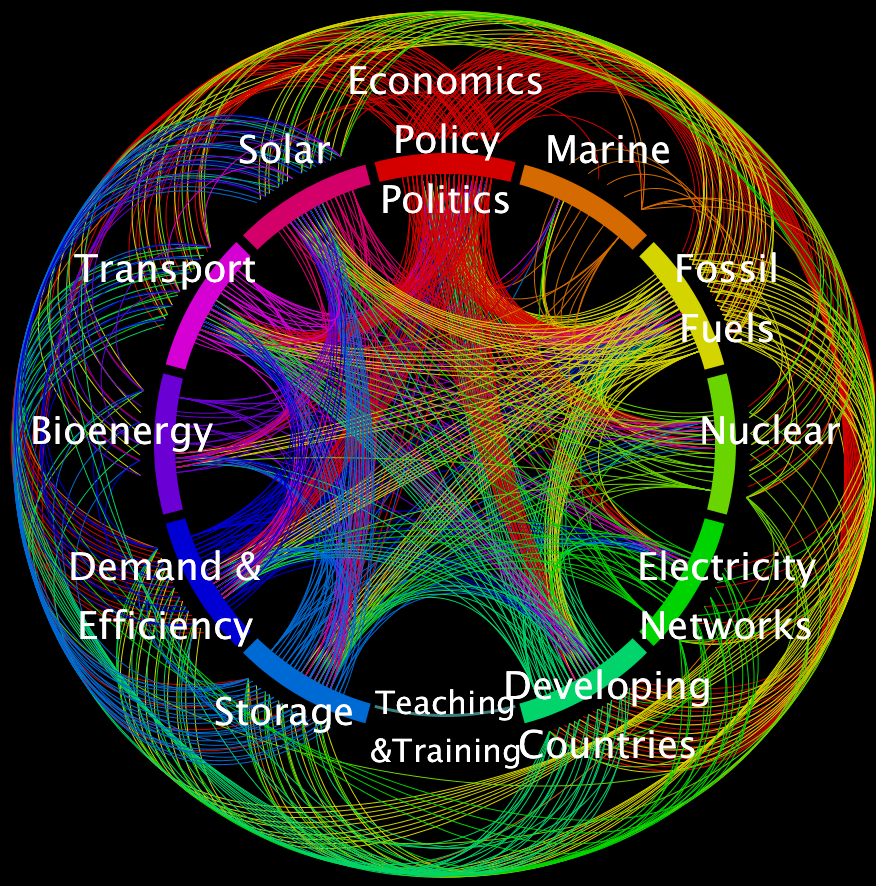 About Shift-0
About Shift-0
Background information for MCS Charitable Foundation
Dr Phil Grunewald
This document sets out the research context and wider vision of the activities relating to the SHIFT-0 project. The proposal “Sustainable Heat Insights for a Fast and Fair Transition to Net Zero (SHIFT-0)”, submitted to the MCS Charitable Foundation, sets out the aims, objectives and timeliness for the project itself. SHIFT-0 aims to improve insights into heat pump performance for practitioners and prospective adopters. The objective is to collect and learn from smart meter data for gas and electricity before and after adoption of heat pumps.
Here we present how the project relates to other activities being undertaken by the University of Oxford and partnering institutions to create impactful energy research.
An overview of major initiatives at the University is shown in Figure 1. Each of them and their relationship to SHIFT-0 is explained below. Of particular relevance are the Oxford Martin School RENEW programme, which provides the software and hardware for monitoring and surveys performed as part of SHIFT-0 research. The Energy Superhub Oxford is performing qualitative research with adopters of heat pumps and we envisage that this cohort can form part of the SHIFT-0 sample, such that we gain the richness of both qualitative and quantitative methods. The Centre for Research into Energy Demand Solutions (CREDS) hosts their Policy & Governance theme at Oxford and we have ongoing collaborations as part of the RENEW programme. SHIFT-0 will build on these connections to ensure effective policy impact of our research.
Oxford Energy

Oxford Energy is one of five networks that form the Oxford Networks for the Environment ONE, alongside Water, Food, Biodiversity and Climate. In 2012 the University of Oxford appointed Professor Sir Chris Llewellyn Smith as Director of Energy Research across all University departments and research disciplines. The resulting network established nearly 200 senior researchers across 11 thematic areas at the University. Ever since its creation, the network has attracted funding for and addressed challenges relating to the cross-cutting challenges of providing secure, affordable and sustainable energy. Figure 2 highlights the connectedness of the 11 themes within the University, resulting in a whole systems perspective, which enables a broad and highly ambitious holistic research agenda.

All members of the network, their research priorities and network activities can be found on energy.ox.ac.uk.
A particular strength of the network is the recognition of the importance of our understanding of Energy Demand as part of a systems perspective of energy challenges. The following sections will highlight some of the initiatives that are specifically relevant to the SHIFT-0 project with MCS.
Oxford Energy hosts an annual Oxford Energy Day, which showcases our latest research and creates a convening space for academic and non-academic audiences. During term time weekly seminars cover the full range of the networks energy brief, often with external guest speakers. Many network members act as STEM ambassadors and engage with schools and community groups.
SHIFT-0 findings will be presented to the network and shared via its media channels.
The Energy Systems Institute (ESI)
The ESI is a Strategic Research Fund initiative, created in 2021 to build upon the University strengths in key energy research areas. Of the three priority topics, two specifically relate to SHIFT-0: Energy use and Heating & Cooling. Each programme will make appointments in the coming year and a Director will be recruited in due course. The Strategic Research Fund provides seed funding for projects which are expected to become self-supporting in due course.
We seek to be actively engaged with these initiatives and support energy use and heating research with insights from SHIFT-0, such that ongoing and impactful programmes can be developed.

CREDS
Professor Nick Eyre at Oxford leads the Centre for Research into Energy Demand Solutions CREDS, comprising of 140 researchers at 24 academic institutions throughout the UK. The core themes cover: Buildings & Energy, Transport & Mobility, Materials & Products, Flexibility, Digital Society and Policy & Governance. In addition CREDS addresses: Decarbonisation of heat, Fuel & transport poverty, Decarbonisation of steel and changes in energy demand relating to Covid-19.
Of these themes Oxford is particularly strongly engaged in SHIFT-0 related activities on Decarbonisation of heat, Flexibility and Policy.
CREDS has been instrumental in raising the profile of demand side research, supporting researchers to increase real world impact and improve equality, diversity and inclusion in energy research. CREDS further supports knowledge exchange via the Energy Demand Research Network (EDRN).
Oxford is host to the core team of CREDS, including the comms and policy functions, such that demand side research can use established channels for dissemination and impact.
National Demonstrator Projects
The Energy Superhub Oxford (ESO) and Local Energy Oxfordshire (LEO) are demonstrator projects part-funded by the UK government’s Industrial Strategy Challenge Fund under its “Prospering from the Energy Revolution” (PFER) programme. Only three such demonstrators have been created nationally and Oxford is part of two of them. The PFER programme is about delivering innovation in smart local energy systems.

Energy Superhub Oxford (ESO)
ESO brings hybrid batteries onto the grid to support EV changing and ground source heating systems. 60 domestic heat pumps will work with shared ground arrays, drilled to a depth of 120m and will use new “shoebox” heat pumps, which can be discretely installed in individual properties. Smart controls will learn the heat profile of the user and optimise heating to deliver cost and carbon savings.
SHIFT-0 is partnering with Dr Sam Hampton, who is conducting qualitative research with participants experiencing heat pump systems for the first time. These qualitative insights will complement our smart meter data insights from these properties.

Local Energy Oxfordshire (LEO)
Project LEO is running trials in Oxfordshire to build a broad range of reliable evidence of the technological, market and social conditions needed for a greener, more flexible, and fair electricity system.
As part of LEO, the “Smart and Fair Neighbourhood” trials demonstrate how flexibility services can sit at the heart of a smarter, low carbon, locally balanced energy system. Local communities, for instance in Deddington and Duns Tew, are looking at how the installation of heat pumps and smart monitoring can help decarbonise rural, off-gas communities. Smart technology and new commercial models are explored for their potential to create opportunities in a local energy marketplace, with particular emphasis on equity and fairness.
Oxford Martin School Programmes
The Oxford Martin School (OMS) funds more than 30 solutions-focused, pioneering research programmes that cut across disciplines to find solutions to the world’s most urgent challenges. Oxford is uniquely placed to convene such ambitious programmes and energy is at the heart of several initiatives. A complete list of programmes, which include indirectly related topics on net-zero societies and climate can be found under Oxford Martin Programmes.
Integrating Renewable Energy
The Oxford Martin Programme on Integrating Renewable Energy is one of the most holistic studies on the challenges of highly renewable driven zero-carbon systems. Leading academics from Economics, Social sciences, Mathematical and Physical Sciences address the technical, market, social, and policy challenges for integrating renewables. Many of the emerging collaborative energy projects throughout the University have been informed or influenced by this programme and the Oxford Martin School continues to support regular meetings for researchers to exchange their knowledge and perspectives. Dr Phil Grunewald is affiliated with the Integrate Programme.
The Future of Cooling
While SHIFT-0 focusses on heating, the Oxford Martin Programme on The Future of Cooling has potentially important areas of overlap relating to thermal comfort, technology adoption and the tensions between boodling fabric, technology and everyday practices. We are collaborating with lead researchers on this programme and anticipate joint areas of insights on the future challenges at the extremes of heat and cold.
Reconfiguring Energy Needs, Equity and Wellbeing (METER / RENEW)
The RENEW project builds on the success of the METER study, which pioneered research on the relationship between everyday activities and people’s energy footprint. In RENEW we take a particular interest in heating and thermal comfort, in an effort to understand how feedback can support the transition of physical systems and the practices that go hand-in-hand with such systems. Many of the tools we proposed to use for SHIFT-0 have been developed as part of the METER study and RENEW. Among them are a diary recording app, electricity monitors and survey tools with supporting database and participant management infrastructure. The latest innovation is a custom designed Consumer Access Device, giving households easier access to their smart meter data and allowing them to share it for research.
Impact and Outreach
Environmental Sustainability Oxford
In March 2021 the University of Oxford approved a new Environmental Sustainability Strategy with two ambitious targets for 2035: to achieve net zero carbon and to achieve biodiversity net gain. The strategy is supported by a commitment of £200 million funding for sustainability initiatives over the next 15 years. The ten priority areas include increased research and engagement in environmental sustainability and a reduction in carbon emissions related to our energy consumption to a minimal level.
To this end Dr Grunewald currently works with two University spin out companies (Pilio Ltd. and EcoSync Ltd.), which help to monitor, control and improve energy consumption, specifically related to heating of departments and student accommodation. We observe occupancy patterns and room booking systems to schedule heating systems and avoid heating empty spaces. In some cases 30% reductions in energy consumption have been achieved this way.

Teaching
In 2018 the University of Oxford launched the first interdisciplinary MSc in Energy Systems. The course is targeted at future leaders of the energy transition and attracts a high calibre of students.
The course is offered as a one year full time or two/three year part time options to support professional development. Uniquely, this MSc covers technical, social and policy challenges of the energy transition.
A dedicated module on Energy Demand introduces Students to demand side challenges and opportunities, drawing on our latest research.
A second MSc in Environmental Change and Management also has regular input from the energy research community, with particular focus on policy and societal aspects of a transition in energy systems.
Both MSc courses produce numerous excellent dissertations on energy demand related topics every year. Students will be offered the opportunity to work with SHIFT-0 data for their dissertation. Our research findings will flow into future lecture material.
For undergraduate engineering students we offer energy related third year projects, which have included conceptual designs of heat networks and heat pump solutions for local communities. Students regularly use our latest research data for their work.
Summary
The aims of SHIFT-0 to learn from load patterns before and after adoption of heat pumps in residential buildings aligns closely with a range of initiatives at the University of Oxford. The project will build on existing methodologies and colaborate with active research initiatives, including local demonstrator projects, national research centres and existing channels of dissemination for impact in academia and policy communities.